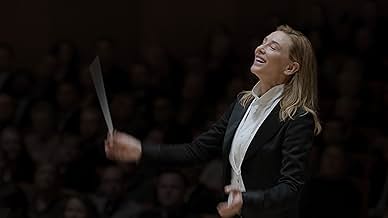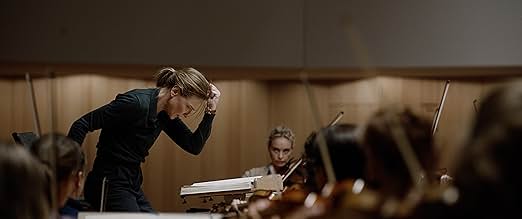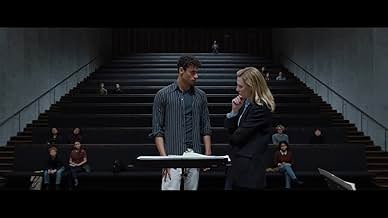पश्चिमी शास्त्रीय संगीत की अंतरराष्ट्रीय दुनिया में स्थापित, फिल्म लिडिया तार पर केंद्रित है।पश्चिमी शास्त्रीय संगीत की अंतरराष्ट्रीय दुनिया में स्थापित, फिल्म लिडिया तार पर केंद्रित है।पश्चिमी शास्त्रीय संगीत की अंतरराष्ट्रीय दुनिया में स्थापित, फिल्म लिडिया तार पर केंद्रित है।
- 6 ऑस्कर के लिए नामांकित
- 79 जीत और कुल 272 नामांकन
Zethphan D. Smith-Gneist
- Max
- (as Zethphan Smith-Gneist)
Alec Baldwin
- Alec Baldwin
- (वॉइस)
फ़ीचर्ड समीक्षाएं
Tár is a dense film. Thick with dialogue and emotional power. It's also a bit tricky to get in to and might be a bit much for the casual viewer. That's a shame though as it's great. Lydia Tár (Cate Blanchett) is a renowned concert conductor. An opening montage leads us into a live interview with the New Yorker, introducing her achievements to date. Let's just say it's a stellar CV. Right from the off, Tár is a force. Confident and assertive, but there are hints of the smallest of cracks. People will often misunderstand the role of a conductor, reducing it to something almost needless. Director and writer Todd Field knows this and lets that opening interview roll, as a device it not only introduces us to Tár, but the world of classical orchestration and her interpretation of it. Like I said, dense. At the top of her game, there's plenty of admirers, both publicly and professionally. Like Elliot Kaplan (Mark Strong) with a fantastic wig, who's told "There's no glory for a robot, do your own thing". Or a room full of nervous students at Juilliard, who also feel the wrath of Tár's uncompromising views. She's putting a lot of herself out there, is she as certain of herself as she appears though and when everything appears so perfect and controlled, what aren't we seeing. Those potential cracks show themselves through Francesca (Noémie Merlant), she's the assistant. Seemingly subordinate, she's clearly privy to some weakness, could be the weakness, or quite the opposite. Tár's partner Sharon (Nina Hoss) too. She has a fragility and brings out a tenderness in Tár, but there's something else. It's clear that Tár intends on retaining her position, status, power. Ruthlessly if required. These personal moments though really help the flow of this film. Although slightly bleak, they're a breath of fresh air in Tár's austere world. It's a beautiful world though. Rooms vast with modernist lines and understated grandeur. I find myself lost in these spaces as Tár too begins to ebb. I can imagine that classical music students might lap the opening acts up, it feels important. Is it though, or is it an impenetrable pretentious three hour indulgence. I'd say it's neither. It's a slow burning drama. That doesn't so much as unfold as gently slides into a darkness as Tár's facade crumbles. Accelerated by the arrival Olga (Sophie Kauer) a no nonsense Russian cellist, brought in to help a live performance recording of Mahler's Symphony No.5... but is anything but a stabilising presence. It demands your attention. Blanchett is incredible. It's an explosive performance. Utterly captivating. A singular pivotal presence. "It's not a democracy". She needs to be too. At not far off 3 hours, it's an intense experience. Be prepared to be patient, but you will be rewarded.
How much you enjoy Tar will depend largely on how you feel about a film that begins with the credits. There's good reason for it (everything in Tar is considered down to the smallest detail) but if you can't get on board with that kind of self indulgence then you are in for a long two and a half hours.
One of the reasons for beginning with the credits may be that we are about witness a career in reverse. An opening interview lets us know that Lydia Tar is at the top of her profession, a conductor with a dream resume and an EGOT who is about to complete her masterpiece symphony recording. Over the next couple of hours we see her slipping down the mountain as past deeds and the way she treats people in general come back to take a bite out of her perfect life.
The film solely follows Kate Blanchett's Tar for the entire runtime, we see all events from her perspective and she is in every scene. Blanchett put its an astounding performance, indeed it is hard to imagine many, if any, other actors who could have been up to the task. That the whole show rests on such a powerful but subtle turn is Tar's greatest strength but also its only real weakness. Its a nuanced performance that fits perfectly but added to the characters flawed nature it can at times leave proceedings feeling cold and hard to connect with emotionally. Like its titular character Tar is a film of craftmanship and intellect not emotion, although the themes of hierarchy dynamics and abuse are powerful.
If you can get on board with the full force filmaking style then you will find Tar a breathtaking wonder of a movie with something to think about in every scene and something to ponder long after the (second lot of) credits roll.
9 successful recordings out of 10 symphonies.
One of the reasons for beginning with the credits may be that we are about witness a career in reverse. An opening interview lets us know that Lydia Tar is at the top of her profession, a conductor with a dream resume and an EGOT who is about to complete her masterpiece symphony recording. Over the next couple of hours we see her slipping down the mountain as past deeds and the way she treats people in general come back to take a bite out of her perfect life.
The film solely follows Kate Blanchett's Tar for the entire runtime, we see all events from her perspective and she is in every scene. Blanchett put its an astounding performance, indeed it is hard to imagine many, if any, other actors who could have been up to the task. That the whole show rests on such a powerful but subtle turn is Tar's greatest strength but also its only real weakness. Its a nuanced performance that fits perfectly but added to the characters flawed nature it can at times leave proceedings feeling cold and hard to connect with emotionally. Like its titular character Tar is a film of craftmanship and intellect not emotion, although the themes of hierarchy dynamics and abuse are powerful.
If you can get on board with the full force filmaking style then you will find Tar a breathtaking wonder of a movie with something to think about in every scene and something to ponder long after the (second lot of) credits roll.
9 successful recordings out of 10 symphonies.
Initially I was put off by Tár-it's cryptic, drab, and sluggish. Until I realized what the filmmakers were actually accomplishing. No spoilers in this review, but to enjoy the film you have to know certain things:
1. Yes, Cate Blanchett is fantastic and rightfully deserves the accolades.
2. The film is the slowest of slow burns.
3. The film does not hold your hand.
4. The film's narrative cuts out key elements of scenes that other filmmakers would have highlighted. This was the sticking point for me-it didn't dawn on me until halfway through the film what was happening. If you know this going in, I believe you'll have a better experience with the film. The film purposefully *doesn't* show you the "important" elements of scenes or relationships between characters. You have to figure that out yourself, just like putting together the puzzle of who Lydia Tár actually is. Here's a quick non-related example:
Bill stared at the smoke in the frying pan.
Bill rubbed his nose five times and took a call from Ernest while sipping coffee at Station 271.
If those two sentences above were in a book, it would be leaving out major plot points that other authors would have filled in. First, there was a fire in Bill's kitchen. He called the fire department. He had to evacuate, so the fire may have been bad. And who is Ernest, if we have not been introduced to that character before? Why is bill rubbing his nose so much? Is it a tick or OCD or nervous habit?
That's what Tár is like. It presents to you all the items "between the lines" and lets you solve for X for yourself. Once I understood that that was the dominant cinematic approach in this film, it became immensely more enjoyable...and challenging. Very much worth your time if you put in the effort.
1. Yes, Cate Blanchett is fantastic and rightfully deserves the accolades.
2. The film is the slowest of slow burns.
3. The film does not hold your hand.
4. The film's narrative cuts out key elements of scenes that other filmmakers would have highlighted. This was the sticking point for me-it didn't dawn on me until halfway through the film what was happening. If you know this going in, I believe you'll have a better experience with the film. The film purposefully *doesn't* show you the "important" elements of scenes or relationships between characters. You have to figure that out yourself, just like putting together the puzzle of who Lydia Tár actually is. Here's a quick non-related example:
Bill stared at the smoke in the frying pan.
Bill rubbed his nose five times and took a call from Ernest while sipping coffee at Station 271.
If those two sentences above were in a book, it would be leaving out major plot points that other authors would have filled in. First, there was a fire in Bill's kitchen. He called the fire department. He had to evacuate, so the fire may have been bad. And who is Ernest, if we have not been introduced to that character before? Why is bill rubbing his nose so much? Is it a tick or OCD or nervous habit?
That's what Tár is like. It presents to you all the items "between the lines" and lets you solve for X for yourself. Once I understood that that was the dominant cinematic approach in this film, it became immensely more enjoyable...and challenging. Very much worth your time if you put in the effort.
It is not surprising that this film is tanking at the box office since it is much too long and slow paced for the average movie goer's attention span. Indeed parts of it, like the agonizingly protracted opening scene where a New Yorker magazine music critic interviews the title character about her classical music esthetics, seem designed by writer/director Tod Field as a boredom experiment wherein if you can survive it without running and screaming into the night out of sheer and utter ennui then you are worthy to see the rest of his "masterpiece".
Thing is, though, that a lot of this film does approach, if not encroach upon, masterpiece territory. Certain scenes, like Lydia Tar's bleak Staten Island homecoming where she summons the spirit of her mentor Leonard Bernstein in an effort to recapture the humanistic values she has lost, are genuinely heartbreaking. And the sequences that deal with Lydia's manipulation of her acolytes are difficult to watch as we see how artistic power feels even more corruptible, somehow, than the political kind, perhaps because it is a profanation of a purer space.
And I think we can all agree that Cate Blanchett is one helluva fine actor! As are Nina Hoss, Noemie Merlant and Sophie Kauer who play various of her entourage/victims.
Bottom line: For all its faults I have a sneaking suspicion that in twenty years they'll be watching this and not "The Fabelmans". Give it a B plus.
Thing is, though, that a lot of this film does approach, if not encroach upon, masterpiece territory. Certain scenes, like Lydia Tar's bleak Staten Island homecoming where she summons the spirit of her mentor Leonard Bernstein in an effort to recapture the humanistic values she has lost, are genuinely heartbreaking. And the sequences that deal with Lydia's manipulation of her acolytes are difficult to watch as we see how artistic power feels even more corruptible, somehow, than the political kind, perhaps because it is a profanation of a purer space.
And I think we can all agree that Cate Blanchett is one helluva fine actor! As are Nina Hoss, Noemie Merlant and Sophie Kauer who play various of her entourage/victims.
Bottom line: For all its faults I have a sneaking suspicion that in twenty years they'll be watching this and not "The Fabelmans". Give it a B plus.
Everybody writing about this mock biopic focuses on Cate Blanchett's knock-it-out-of-the-park performance, but when compared to Field's "Little Children" (2006), "Tár" lacks the storytelling and editing skills which make the earlier film a masterpiece of human relations, whereas the latter is an interesting character study that somehow collapses under its own weight.
There's a strong establishing scene showing Tár demolishing an aspiring musician's conceited views on Bach, yet one has to wait for a long time for a follow-up showing the main character's boundary issues. The central topic emerges rather quickly (abuse of power), but there are diversions which support character development, yet drag on the narrative, which is probably why many reviews here find the film frustrating.
Being an ex-Berliner, I like the fact that the city is being used as a real location as opposed to the usual tourist / Cold War hot spots, and the Philharmonics rehearsal scenes are very well done, but they don't really push the story forward and could have easily been wound down a bit.
Nina Hoss as Tár's partner is a brilliant counterpoint, because she keeps a good deal of her thoughts to herself until she doesn't, so more focus on their relationship would have helped the story. Hoss would deserve a supporting actress Academy Award nod if only she had more screen time.
The initial scene of conflict eventually loops back into focus, and Field could have used this to explore societal misjudgment as he did in "Little Children" - but he doesn't, which makes "Tár" rather distant and cold. Field expects viewers to interpret a lot on their own, which is bold and demanding, but with this approach it is crucial to keep focus on an underlying message, otherwise it gets lost.
In conclusion, "Tár" has all the ingredients for a masterpiece - interesting characters, great performances, nice camerawork - but weak storytelling ultimately reduces the film's potential.
There's a strong establishing scene showing Tár demolishing an aspiring musician's conceited views on Bach, yet one has to wait for a long time for a follow-up showing the main character's boundary issues. The central topic emerges rather quickly (abuse of power), but there are diversions which support character development, yet drag on the narrative, which is probably why many reviews here find the film frustrating.
Being an ex-Berliner, I like the fact that the city is being used as a real location as opposed to the usual tourist / Cold War hot spots, and the Philharmonics rehearsal scenes are very well done, but they don't really push the story forward and could have easily been wound down a bit.
Nina Hoss as Tár's partner is a brilliant counterpoint, because she keeps a good deal of her thoughts to herself until she doesn't, so more focus on their relationship would have helped the story. Hoss would deserve a supporting actress Academy Award nod if only she had more screen time.
The initial scene of conflict eventually loops back into focus, and Field could have used this to explore societal misjudgment as he did in "Little Children" - but he doesn't, which makes "Tár" rather distant and cold. Field expects viewers to interpret a lot on their own, which is bold and demanding, but with this approach it is crucial to keep focus on an underlying message, otherwise it gets lost.
In conclusion, "Tár" has all the ingredients for a masterpiece - interesting characters, great performances, nice camerawork - but weak storytelling ultimately reduces the film's potential.
क्या आपको पता है
- ट्रिवियाProfessional cellist Sophie Kauer had no prior acting experience and auditioned at the encouragement of a friend. She learned to act by watching YouTube tutorials hosted by Michael Caine.
- गूफ़When Lydia is talking to the two technicians after a rehearsal in Berlin, she requests they send her audio and video recordings, but the console in front of them in the booth is actually for controlling lights, not audio/video.
- क्रेज़ी क्रेडिटThe opening credits presents the film crew and acknowledgments (usually shown at the end titles) without presenting the actors. The actors and soundtrack are shown at the ending without the crew.
- कनेक्शनEdited from The Blair Witch Project (1999)
- साउंडट्रैकDas Wohltemperierte Klavier: Präludium and Fuge C-Dur, BWV 846
Written by Johann Sebastian Bach
Piano, Cate Blanchett
टॉप पसंद
रेटिंग देने के लिए साइन-इन करें और वैयक्तिकृत सुझावों के लिए वॉचलिस्ट करें
- How long is Tár?Alexa द्वारा संचालित
विवरण
- रिलीज़ की तारीख़
- कंट्री ऑफ़ ओरिजिन
- आधिकारिक साइटें
- भाषाएं
- इस रूप में भी जाना जाता है
- Tar
- फ़िल्माने की जगहें
- ड्रेस्डेन, सैक्सनी, जर्मनी(Kulturpalast & Großen Garten Platz)
- उत्पादन कंपनियां
- IMDbPro पर और कंपनी क्रेडिट देखें
बॉक्स ऑफ़िस
- बजट
- $2,50,00,000(अनुमानित)
- US और कनाडा में सकल
- $67,73,650
- US और कनाडा में पहले सप्ताह में कुल कमाई
- $1,58,620
- 9 अक्टू॰ 2022
- दुनिया भर में सकल
- $2,91,77,163
- चलने की अवधि2 घंटे 38 मिनट
- रंग
- ध्वनि मिश्रण
- पक्ष अनुपात
- 2.39 : 1
इस पेज में योगदान दें
किसी बदलाव का सुझाव दें या अनुपलब्ध कॉन्टेंट जोड़ें



































